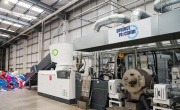Veolia wins £460m Leeds residual waste contract

Artist's impression of the Leeds CHP plant
Veolia Environmental Services (UK) has signed a 25-year Private Finance Initiative (PFI) contract with Leeds City Council for residual municipal, commercial and industrial waste treatment and energy recovery.
The contract, thought to be worth around £460 million, includes the installation of a combined heat and power (CHP) plant at East Leeds Cross Green Industrial Area.
Plans for the 214,000 tonne plant have now been submitted to Leeds City Council for approval, and outline that through incinerating residual waste, the facility will generate enough electricity to power 20,000 households and have the potential to also supply heat to local users. However, CHPs have so far been largely unsuccessful in the UK due to the disruptive nature and costs of laying down the appropriate heat pipe networks under pavements and roads.
According to Veolia, the facility could potentially save Leeds City Council around £200 million over the 25 years by removing landfill costs and create 300 jobs during the construction stage and 45 permanent positions during operation.
“This remarkable facility reflects our strategic commitment to the UK market and our sustainable development approach that is reflected in the construction of new waste treatment and energy recovery plants delivering exceptional environmental performance”, said Jérôme Le Conte, CEO of Veolia Environmental Services.
“In the United Kingdom, Veolia Environmental Services is currently involved in 12 PFI/PPPs. This type of partnership contract will help make it possible to achieve the targets set under the European Landfill Directive.”
Under the European Landfill Directive, member states must increase efforts for converting waste into a resource. The UK has set its own targets of sending 50 per cent of 1995 levels to landfill by 2013, and 35 per cent by 2020. The British government estimates that achieving these targets will require an investment of £10 billion in waste management infrastructure by 2020.
“In the United Kingdom in particular, clients are turning to us for innovative solutions that enable them to improve their environmental and energy performance”, added Le Conte.
Overcapacity
If approved, this plant would be the latest of several energy-from-waste plants to get the go ahead, despite a recent report from Eunomia Research & Consulting suggesting that the UK could see overcapacity in residual waste treatment plants by 2015, if the current rate of construction is not curbed.
The report suggests that due to increased emphasis on recycling, reusing and recovering material, residual waste rates are falling, leaving incinerators without the required levels of waste needed to produce efficient and cost-effective processes.
It is feared that this would lead to more recyclable materials being sent for incineration to “feed” the plants.
Yesterday (8 November), the Department for Environment, Food and Rural Affairds (Defra), released statistics showing that for the first time on record, England sent more waste for recycling, composting or reuse than it did to landfill.
If planning permission for the CHP is granted, construction on the plant is expected to begin in summer 2013, with operations scheduled to begin in spring 2016.
Read more about Veolia’s Leeds CHP.




